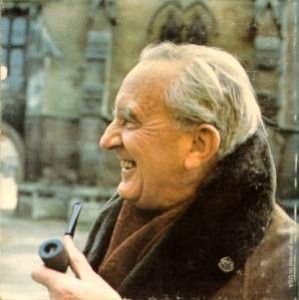Thursday

A Bullet Life of JRR Tolkien 1892-1973
Father died when Tolkien was 4. When he was 8, his mother became Roman Catholic, to the fury of her relatives. They withheld financial support in hopes she'd renounce the Church. She didn't and had to go to work. She died four years later due to lack of money for medical treatment. She left her two sons under the guardianship of the Oratorian priest Francis Morgan.
It's a sad story, but you need to understand what it meant for Tolkien. As a young adult, he wrote of it: She "was a martyr indeed, and it is not to everybody that God grants so easy a way to his great gifts . . . giving us a mother who killed herself with labour and trouble to ensure us keeping the faith." One scholar writes of this: "Cliches about the influence of devout mothers do not begin to describe the force of an inheritance like this. . . . Tolkien saw his actual mother collapse into what proved a diabetic coma whence she died six days later . . . Whatever he did was going to be Catholic. . . . to think of Tolkien's labours as somehow removed from his church is thus as absurd as thinking of them as somehow removed from his life." Owen Dudley Edwards, Edinburgh University.


He was an intense Catholic the rest of his life. Professor of philology at Oxford.
Now, combine his Catholicism with what he did in Middle Earth. Middle Earth was a "sub-creation," a phrase Tolkien used in a famous essay he wrote on faerie tales. In that essay, he said 'sub-creation' involves the creation of an imaginary world as much as possible along the lines God might have used, had he decided to create it.
Now, use your imagination just a bit. Put yourself in Tolkien's shoes. You're setting out to create a world that parallels reality as closely as possible. Your understanding of reality contains some fundamental things–the existence of God and His role in earthly affairs, though often very sublte; the Fall of man; the role of grace; virtue and vice, the great sin of pride, a sacramental view of things that combines the material and spiritual in subtle ways. As Catholics we know these things, but for someone of Tolkien's intense Catholicity and sensitivity of spirit and acuteness of mind, these things played huge roles. Consequently, when he set out to make a sub-creation, it was highly Catholic. It not his intent to create a Catholic sub-creation; but neither did he set out not to create a Catholic sub-creation. He just created, and the result was a Catholic one. Sometimes implicit; sometimes explicit.
Indeed, Tolkien said that, when he re-worked Middle Earth, he made it more explicitly Catholic. In a letter he wrote in 1953, he said, "The Lord of the Rings is of course a fundamentally religious and Catholic work; unconsciously so at first, but consciously in the revision."
